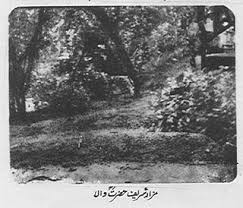
اوروں پر معترض تھے لیکن جو آنکھ کھولی
اپنے ہی دل کو ہم نے گنج عیوب پایا


اوروں پر معترض تھے لیکن جو آنکھ کھولی
اپنے ہی دل کو ہم نے گنج عیوب پایا

The final list of authorized representatives (khulafa) of Hakim al-Umma Mawlana Ashraf Ali Thanawi (Allah have mercy on him) has 70 mujaz e baiyet and 59 mujaz e sohbet. That is, 129 in total.
This does not include those who died prior to the passing away of Hakim al-Ummat.
‘Ma’asir e Hakim al Ummat‘, pages 189 – 196 (quotes via Ashraf us sawanih)

Hakim al-Umma Mawlana Ashraf Ali Thanawi (Allah have mercy on him) said,
‘The real criteria for being pious (buzurg) is that as one progresses in spirituality the more he resembles the Prophet (Allah bless him and give him peace).
This is because the friendship of Allah (wilayet) is a derivative of the Prophethood (nubuwat).’
al-Rafiq fi suwa it-Tareeq, Malfuzat e Hakim al-Ummat volume 27-28, page 89

Our Shaykh Ziauddin Abun Najeeb Suhrawardi (Allah have mercy on him) narrates that,
‘The virtue (khair) in the people of Tasawwuf will last only till they act with disinclination amongst themselves. They will be destroyed once they develop mutual concordance and live in harmony with each other.
Shaykh Ruaim (Allah have mercy on him) has pointed out that this means that they should keep an eye on and hold each other accountable (that is, do their muhasaba for things that are inappropriate).’
Awarif al-Ma’arif, page 267 (Urdu translation published by Progressive books, Lahore)

Hakim al-Umma Shaykh Mawlana Shah Ashraf Ali Thanawi (Allah have mercy on him) said:
“Listen and remember, I tell this for your own benefit.
In this path (tareeq) two things are the worst rogue and the deadliest poison.
Firstly, making explanations for one’s mistakes and secondly, criticizing one’s instructor (the Sheikh).”
Maasir e Hakeemul Ummat 406

Sayyidi wa sanadi Shaykh Moulana Mohammad Taqi Usmani (Allah SWT preserve him and allow us to benefit from him abundantly. Ameen!) said:
“After professing faith (emaan) the foremost duty and obligation that befalls an individual is to acquire religious knowledge. This is because until he knows what is required essentials (faraiz & wajibat)) to do and from what things to abstain from, he will not be able to fulfill the requirements of faith.”
Ina’mul Bari (duroos-e-Bukhari shareef) volume 2, page 27


Shaykh Haji Imdadullah mohajir Makki gave khilafat to Mawlana Rasheed Ahmad Gangohi (Allah have mercy on them) after eight days and told him: ‘Moulvi Rasheed Ahmed sahib whatever favour (nimat) Allah has bestowed upon me, He has also bestowed upon you. It will be your duty to go develop that nimat and work on it.’
Mawlana Gangohi used to say: ‘I was very surprised. I could not understand what nimat he was referring to, which had been granted to him and also to me. I only managed to understand and realise what it was fifteen years later.’
[Tazkira e Khaleel vol 1]
From: Aap beeti
Shaykh Dr. Abdul Hayy Arifi (Allah have mercy on him) explicitly told his khulafa (Mufti Rafi Usmani db, Mufti Taqi Usmani db, Mufti Sehban Mehmood ra and others) to wait for spiritual puberty & maturity (of wich they will become undoubtedly aware of themselves) before taking the responsibility of being a Shaykh in spite of having recieved permission (ijazet) to guide others.

مولانا سید ابوالحسن علی ندوی رحمۃ اللہ علیہ فرماتے ہیں،
میرے نزدیک مسلمانوں کا اس وقت مرض نہ کفر ہے نہ جہل ہے
اور نہ عمومی و عالمگیر فسق۔
ان کا مرض ظاہر و باطن کا اختلاف،
عقیدہ و عمل کی عدم مطابقت،
دعوے اور عمل کا تضاد،
عبادت اور اخلاق میں نہ صرف عدم مناسبت بلکہ بعد،
دنیا کو آخرت پر ترجیح،
اپنے حقیر و موہوم مفاد کے لئے دوسروں کے حقوق کی پامالی اور حق تلفی،
شریعت کو زندگی کے تمام شعبوں میں جاری و ساری نہ کرنے کی عادت،
رسوم و مظاہر کو حقائق و جواہر پر مقدم رکھنا اور ان کی احکام الہی کی طرح تعمیل کرنا ہے۔
(حیات مصلح الامت رح، ص3)

Advising a couple facing frequent marital conflicts sayyidi wa sanadi Shaykh Mohammad Taqi Usmani (may Allah preserve him) told the husband,
“Express your love, good feelings and admiration for your wife often.
This is a part of deen.
It is her right (haq).”
7th Decemeber 2007

Shaykh Raziuddin Ahmad Fakhri (may Allah have mercy on him) said,
“Similar to the good and bad effects of the company of an individual and the items of his/her personal use, books, magazines and newspapers also have these effects.
One has to be very cautious in deciding which book or newspaper to read. “
Ahl e sulook per achi buri sohbet kay aseraat, page 22
This is also relevant for internet.
Wasting time by visiting unhealthy sites, engaging in useless discussions, chatting, viewing photos or videos and listening to unreliable audio speeches and nasheeds, etc. can be very detrimental spiritually for a seeker.

Shaykh Mawlana Mohammad Yaqub Nanotawi (Allah have mercy on him) said,
‘The accepted path is rooted in the following of Sunna.
This following is in obvious and esoteric affairs, beliefs and actions.
The reality of following the Sunna in our era is avoidance of innovations and traditional rituals (rusoom).’
Maktubat e Yaqubi ra, page 11
نعمتیں مل گئیں ہیں آہوں کی
ایسی تیسی میرے گناہوں کی
بابا نجم احسن رح
 .
.
……..sometimes passes through rough terrain
A sincere seeker wrote of his declining spiritual condition to one of his close friend. He received the following reply. Being in sync with the teaching of sayyidi wa sanadi Shaykh Mufti Mohammad Taqi Usmani (may Allah preserve him) it is worth sharing.
In the name of Allah,
as salam o alaykum
JazakAllah for the kind email.
I read it in detail. Be assured that these are the natural up and downs of the path. As the Friends of Allah (awliya) say,
“Truly the fortunate one is he, who is blessed with the ability to recognize his own shortcomings.”
All praise is for Allah, that you have done this. That is, recognized and acknowledged the problem.
Now the second part is at hand. That is, to overcome these short comings. This is the spiritual struggle (mujahida). This will be facilitated by asking Allah sincerely to make it easy to control these unlawful desires (to indulge in sins). At the same time you will have to put all your effort in trying to do so. That is, using self determination (himmat). There is no short cut to success without genuine determination. In absence of sincere effort the likelihood of giving up sins will only be a wishful thinking.
You have already recognized that failure to follow a daily schedule of wird, etc. and loss of regular contact with Shaykh have resulted in this. Try to overcome these. You are smart, intelligent and hardworking. You can do it.
Set your priorities.
Ask your wife or a close friend to remind you of them if they see you slipping.
Set a penalty if you do slip. Like four units (rakat) salah of repentance and/or skipping everything sweet that day, or something similar that is a burden on your self (nafs). This is to remind and ingrain that mistakes have consequences.
It is okay to slip and fall.
However, it is not okay to keep lying flat in dirt for ever.
Saturday 5th July, 2008/1st Rajab 1429

A murid wrote:
I do not find any of the daily activities (i.e. salat, dhikr, reading, etc.) interesting. I feel as if all my emotions and feelings are numb. Please, advice!
Sayyidi wa sanadi Hazrat Mawlana Mohammad Taqi Usmani (Allah preserve him and allow us to benefit from him abundantly. Amin!) replied;
This is also one of the (inner) states (hal).
It seems to convey an important message regarding the inner states.
It is emphasizing that the necessary things are to be done even without passion. Having enthusiasm, fervor, dedication is not essential (for action). And in most situations this is more beneficial.
(That is, without emotional involvement actions are done purely for Allah SWT. There is no mixing/partnership of satisfaction of one’s enthusiasm.)
Islahi Khutoot